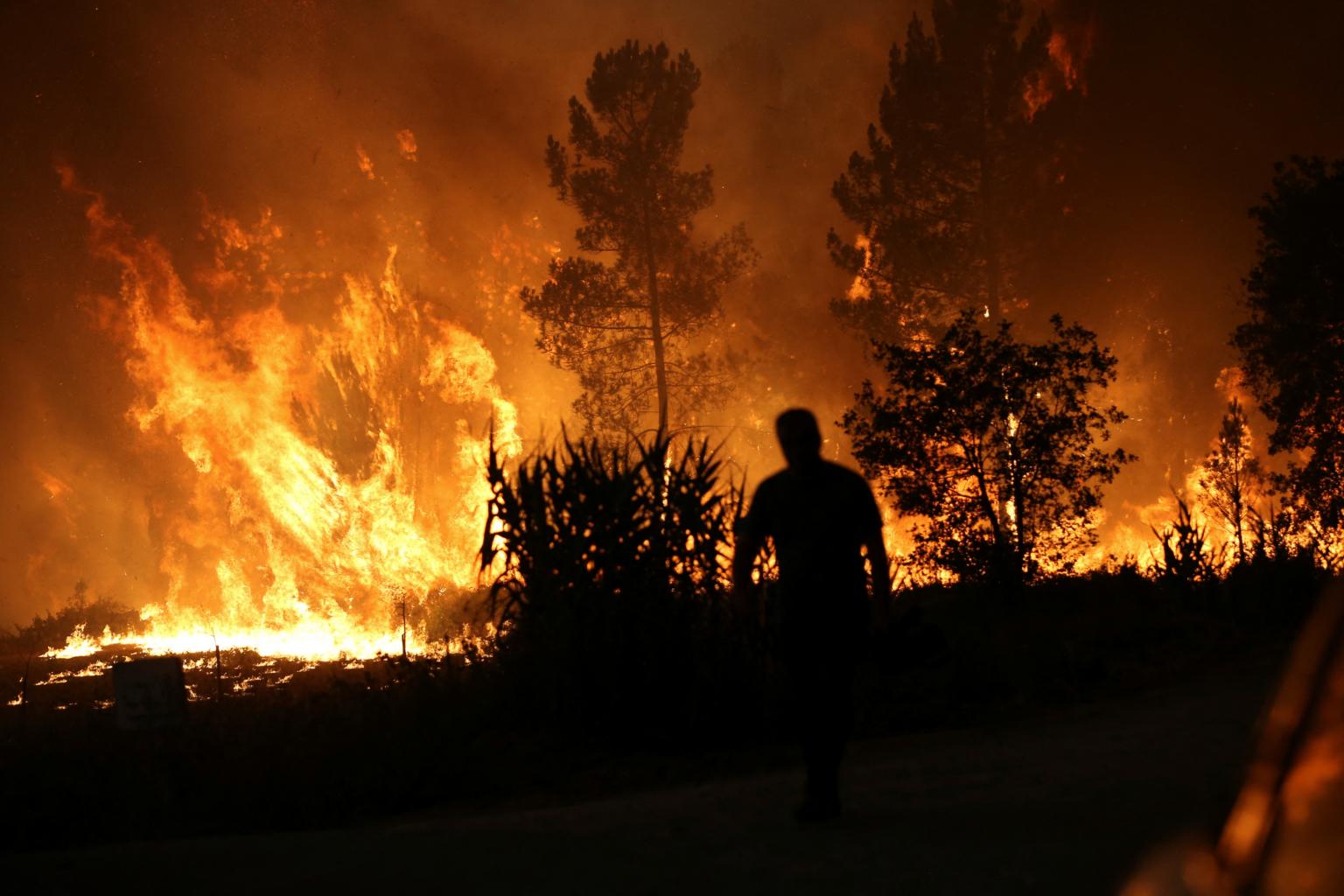As Europe boils, climate change will fuel even worse heatwaves: Experts
Sign up now: Get ST's newsletters delivered to your inbox

A person walks near a wild fire in Ourem, Santarem district, Portugal, on July 12, 2022.
PHOTO: REUTERS
SINGAPORE - The intense heat baking southern Europe and the wildfires that are scorching countries from Portugal to Turkey have one common denominator: climate change.
Scientists say the heatwave sweeping Europe - the second in a matter of weeks - is a clear consequence of global warming and that the outlook for the continent is that things can only get worse if greenhouse gas emissions keep rising.
Of the many impacts of climate change, including floods, storms and droughts, heatwaves have the strongest scientific, or causal, link to warming triggered by pumping vast amounts of greenhouse gases into the air - chiefly carbon dioxide (CO2) from burning fossil fuels.
"Climate change is driving this heatwave, just as it is driving every heatwave now," said Dr Friederike Otto, senior lecturer in climate science at the Grantham Institute at Imperial College London and co-lead of the World Weather Attribution (WWA) initiative.
"Greenhouse gas emissions, from burning fossil fuels like coal, gas and oil, are making heatwaves hotter, longer-lasting and more frequent. Heatwaves that used to be rare are now common," she said in a statement from the Global Strategic Communications Council, a climate outreach organisation funded by foundations, on Friday (July 15).
WWA is an international collaboration created to answer the question: To what extent have specific weather events been influenced by climate change?
Since it was founded in 2014, the group has analysed dozens of events, including floods, heatwaves and wildfires, providing a growing body of evidence of climate change links.
The group recently concluded that climate change made the deadly March-to-May heatwave in India and Pakistan 30 times more likely.
"Heatwaves will keep getting worse until greenhouse gas emissions are halted. The longer it takes the world to reach net-zero emissions, the hotter and more dangerous heatwaves will get, and the more common and longer-lasting they will be," Dr Otto said.
While summer heatwaves are normal in Europe, the scale of this year's event is particularly worrying.
Temperatures are reaching mid-40 deg C in some areas, and fire crews are battling blazes in parts of Morocco, Spain, France, Croatia, Greece and Turkey.
In south-western France, more than 1,000 firefighters backed by nine water-bombing planes were battling two wildfires that started on Tuesday (July 12), Reuters reported. Thousands of people were evacuated from nearby campsites.
A study published in the journal Nature last week found that the number of heatwaves in Europe has increased three to four times faster than in the rest of the northern mid-latitudes, such as the United States and Canada, due in large part to the jet stream air current splitting into two parts for longer periods.
"Europe is very much affected by changes in atmospheric circulation," co-author Kai Kornhuber, a climate scientist at Columbia University, told Reuters. "It's a heatwave hot spot."
Britain is also bracing itself for high temperatures. The UK Met Office on Thursday issued an amber warning about the approach of extreme heat for much of England and parts of Wales into early next week, meaning temperatures could exceed 35 deg C.
Dr Eunice Lo, climate scientist at the University of Bristol in England, said the temperature record for Britain is 38.7 deg C, recorded at Cambridge University Botanic Garden in July 2019. "Scientists expect this record to be broken in the future because of climate change."
Extreme heat can be deadly to people. Dr Lo said that on average, about 2,000 extra deaths in England are linked to heatwaves each year.
"We need to adapt to heat in the long term. This includes designing homes, schools and hospitals that have good ventilation and prevent overheating, increasing green space and parks in cities, and making heat warnings accessible to all," she said in the council statement.
Ms Roop Singh of the Red Cross Red Crescent Climate Centre said in the same statement: "As long as we delay action on climate, it's inevitable that Europe will see hotter and more frequent heatwaves like this one. Any action we can take now to create cooler cities is an investment for a more resilient future."


